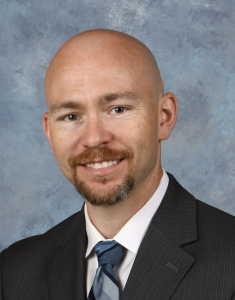From cautiously optimistic to full-on fan, Kyle Cooper, MD, has seen his opinion of Online Longitudinal Assessment evolve since he started participating shortly after earning his ABR certification.
“I was fairly excited,” Dr. Cooper said about how he felt when he heard about OLA. “As a resident, I had observed first-hand several of my attendings struggling to balance studying for their upcoming recertifying examinations with a busy clinical load and academic responsibilities.

“To me, it made much more sense to have a program which continuously assesses knowledge, ensuring that knowledge stays up-to-date consistently rather than binge studying just to prepare for a test.”
Dr. Cooper serves as associate director of IR and residency program director at Loma Linda University School of Medicine. He has been a practicing interventional radiologist for six years.
He said he doesn’t hear many of his colleagues talking about OLA. They had more to say when they had to travel every 10 years, at the time, to take a Continuing Certification (MOC) exam.
“It doesn’t come up too much in conversation and I think that is supportive of my point,” Dr. Cooper said. “OLA is a much less intrusive system for physician assessment than a huge test every few years, so it will stir up a lot less frustration and complaining.”
Participating in OLA to satisfy Part 3 of Continuing Certification does more than save time and money. Dr. Cooper believes it also gives diplomates a better understanding of where their education stands over an extended period.
“I feel that OLA does a better job at ensuring that knowledge is kept up to date with current standards and evidence, and that retention is better when facts are digested two questions at a time,” he said. “Much of the knowledge gained through cramming for large tests every once in a while is unfortunately lost shortly after the test is completed. Physics, anyone?”
Dr. Cooper said he answers both OLA questions he receives every Monday as he has morning coffee. The platform offers most participants the chance to stop for the year once they reach their annual progress requirement, typically 52 questions. Because the platform allows it, he has kept going the past couple of years.
“The first year, I stopped answering them after I reached the required minimum, but the past two years, I have just kept going,” he said. “Why limit your learning when it takes such a small amount of time each week?”
Dr. Cooper completed his radiology residency at The Ohio State University and an interventional radiology fellowship at Miami Vascular. He earned his certification in October 2017, less than two years before OLA started in January 2019. He’s happy with the timing.
“It seemed like a no-brainer, and I was glad the change coincided with the beginning of my career,” he said.


